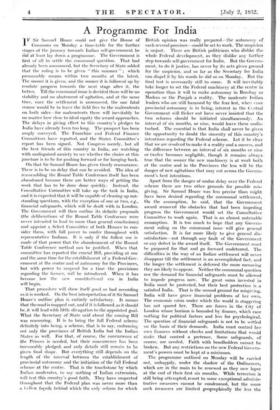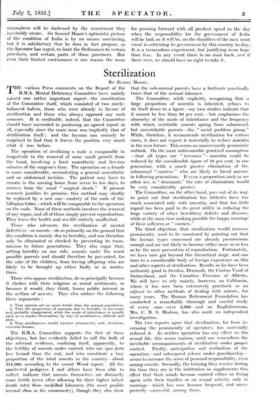A Programme For India
F Sir Samuel Hoare could not give the House of Commons on Monday a time-table for the further stages of the journey towards Indian self-government he did at least lay down a programme. The Government is first of all to settle the communal question. That had already been announced, but the Secretary of State added that the ruling is to be given "this summer" ; which presumably means within two months at the latest. The sooner it is given, and the sooner it is followed up by - resolute progress towards the next stage after it, the better. 'fill the communal issue is decided there will be no stability and no abatement of agitation, and at the same time, once the settlement is announced, the one fatal course would be to leave the field free to the malcontents on. both sides—for malcontents there will inevitably be no matter how close to ideal equity the award approaches. The delays in giving effect to this country's pledges to India have already been too long. The prospect has been amply surveyed. The Franchise and Federal Finance Committees have reported, and the States Committee's report has been signed. Not Congress merely, but all the best friends of this country in India, are watching with undisguised anxiety to see whether the choice at this juncture is to be for pushing forward or for hanging back.
On that Sir Samuel Hoare has given timely reassurance. There is to be no delay that can be avoided. The idea of reassembling the Round Table Conference itself has been abandoned because there are better ways of getting the work that has to be done done quickly. Instead, the Consultative Committee will take up the task in India, and it is expected that it will be capable of clearing up out- standing questions, with the exception of one or two, e.g., financial safeguards, which will be dealt with in London. The Government will then outline its definite proposals (the deliberations of the Round Table Conference were never intended to lead to more than general conclusions) and appoint a Select Committee of both Houses" to con- sider them, with full power to confer throughout with representative Indians. It is only if the fullest use is made of that power that the abandonment of the Round 'fable Conference method can be justified. When that committee has reported the crucial Bill, providing at one and the Oame time for the establishment of a Federal Gov- ernment at the centre and of autonomy for the Provinces, but with power to suspend for a time the provisions regarding the former, will be introduced. When it has become law the new constitutional era in India will begin.
" That procedure will show itself good or bad according as it is worked. On the best interpretation of it Sir Samuel Hoare's outline plan is entirely satisfactory. It means that the road is Mapped out, and if it is followed, as it should' be, it will lead with little divagation to the appointed goal. What the Secretary of State said about the coming Bill was reassuring. It is to bring the full Federal scheme definitely into being, a scheme, that is to say, embracing not only the provinces of British India but the Indian States as well. For that, of course, the concurrence of the Princes is needed, but their concurrence has been irrevocably pledged, and only details still remain to be given final shape. But everything still depends on the length of the interval between the establislunent of provincial autonomy and the initiation of the full Federal scheme at the centre. That is the touchstone by which Indian moderates, to say nothing of Indian extremists, will test this country's good faith. They have suspected throughout that the Federal plan was never more than a hollow facade behind which the only reform for which British opinion was really prepared—the autonomy of each several province—eould be Set to work. The suspicion is Unjust. There are British politicians who dislike the whole Federal development, as they dislike any further step towards self-government for India. But the Govern- ment, to do it justice, has never by its acts given ground for the suspicion, and so far as the Secretary for India can dispel it by his words he did so on Monday. But the final test is necessarily still to come. It will inevitably take longer to set the Federal machinery at.the centre in operation than it will to make autonomy in Bombay or Madras or the Punjab a reality. -The moderate Indian leaders who are still harassed by the fear-lest, when once provincial autonomy is in being, interest in the. Central Government will flicker out have never insisted that the two reforms should be initiated simultaneously. An interval of six months, or nine, would leave them undis- turbed. The essential is that India shall never be given the opportunity to doubt the sincerity of this country's intentions regarding the Federal scheme. Let it be clear that we are resolved to make it a reality and a success, and the difference between an interval of six months or nine or twelve . becomes. negligible, though .it remains always true that the sooner the new machinery is at work both at the centre and in the Provinces the less will be the danger of new agitations that may cut across the Govern- ment's best intentions.
Apart from the danger of undue delay over the Federal scheme there are two other grounds for possible mis- giving. Sir Samuel Hoare was less precise than might have been desired regarding the communal settlement. On the assumption, he said, that the Government award removed the obstacles that had been impeding progress the Government would set the Consultative Committee to work again. That is an almost untenable assumption. It is too much to hope that any Govern- ment ruling on the communal issue will give general satisfaction. It is far more likely to give general dis- satisfaction—not through any fault of the Government or any defect in the award itself. The Government must be prepared for that and go forward undeterred. The difficulties in the way of an Indian settlement will never disappear till the settlement is an accomplished fact, and the longer the settlement is deferred the more menacing they are likely to appear. Neither the communal. question nor the demand for financial safeguards must be allowed to impede progress now. The great sums invested in India must be protected; but their best protection is. a satisfied India. That is the second ground for misgiving. India will have grave financial problems of her own. The economic crisis under which the world is staggering has not spared her. There are: forces in the City of . London whose horizon is bounded by finance, which care nothing for political factors and less for psychological, The question of financial safeguards is not to be settled on the basis of their demands. India must control her own finances without checks and limitations that would make that control a pretence. Some safeguards, of course, are needed. Faith with bondholders cannot be broken. But any restrictions on the new Federal Govern- ment's powers must be kept at a minimum.
The programme outlined on Monday will be earned out, unhappily, under the shadow of the Ordinances, which are in the main to be -renewed as they now lapse at the end of their first six months. While terrorism is still being attempted, resort to some exceptionaladminis- trative measures cannot be condemned, but the more such measures are limited geographically the less the atmosphere will be darkened -by the resentment they inevitably create. Sir Samuel Hoare's optimistic picture of the condition of India is by no . means convincing, but it is satisfactory that . he does in fact propose, as the Spectator has urged, to limit the Ordinances to certain provinces, and certain parts of those provinces. But even their limited continuance is one reason the more for pressing forward with all prudent speed to the day when the responsibility for the government of India will be laid, as it will be, on the shoulders of the men most vocal in criticizing its government by this country to-day: It is a tremendous experiment, but justifying more hope than fear. In any event there is no road back, and if there were, we should have no right to take it.







































 Previous page
Previous page